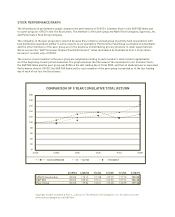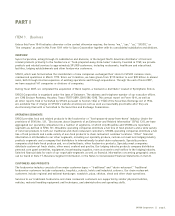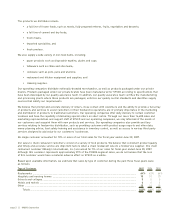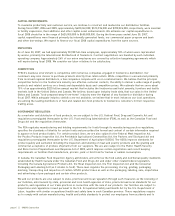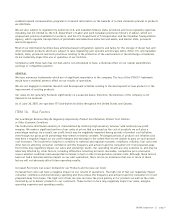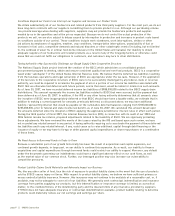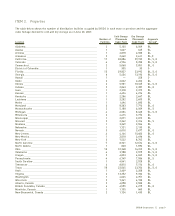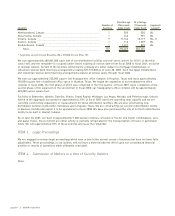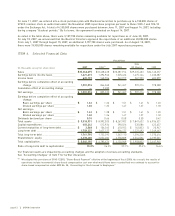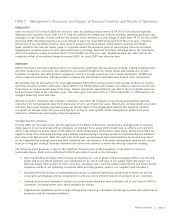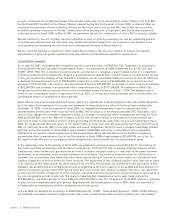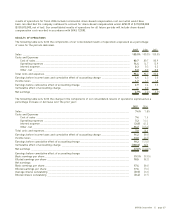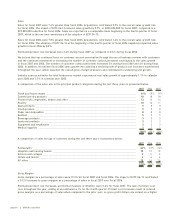Sysco 2007 Annual Report Download - page 32
Download and view the complete annual report
Please find page 32 of the 2007 Sysco annual report below. You can navigate through the pages in the report by either clicking on the pages listed below, or by using the keyword search tool below to find specific information within the annual report.Conditions Beyond our Control can Interrupt our Supplies and Increase our Product Costs
We obtain substantially all of our foodservice and related products from third party suppliers. For the most part, we do not
have long-term contracts with our suppliers committing them to provide products to us. Although our purchasing volume
can provide leverage when dealing with suppliers, suppliers may not provide the foodservice products and supplies
needed by us in the quantities and at the prices requested. Because we do not control the actual production of the
products we sell, we are also subject to delays caused by interruption in production and increases in product costs based
on conditions outside of our control. These conditions include work slowdowns, work interruptions, strikes or other
job actions by employees of suppliers, weather, crop conditions, transportation interruptions, unavailability of fuel or
increases in fuel costs, competitive demands and natural disasters or other catastrophic events (including, but not limited
to, the outbreak of avian flu or similar food-borne illnesses in the United States and Canada). Our inability to obtain
adequate supplies of our foodservice and related products as a result of any of the foregoing factors or otherwise could
mean that we could not fulfill our obligations to customers, and customers may turn to other distributors.
Taxing Authorities May Successfully Challenge our Baugh Supply Chain Cooperative Structure
The National Supply Chain project involved the creation of the BSCC which administers a consolidated product
procurement program to develop, obtain and ensure consistent quality food and non-food products. BSCC is a cooperative
taxed under subchapter T of the United States Internal Revenue Code. We believe that the deferred tax liabilities resulting
from the business operations and legal ownership of BSCC are appropriate under the tax laws. However, if the application
of the tax laws to the cooperative structure of BSCC were to be successfully challenged by any federal, state or local tax
authority, we could be required to accelerate the payment of all or a portion of our income tax liabilities associated with
BSCC that we otherwise had deferred until future periods, and in that event, would be liable for interest on such amounts.
As of June 30, 2007, we have recorded deferred income tax liabilities of $988,000,000 related to the BSCC supply chain
distributions. This amount represents the income tax liabilities related to BSCC that were accrued, but the payment had
been deferred as of June 30, 2007. In addition, if the IRS or any other taxing authority determines that all amounts since
the inception of BSCC were inappropriately deferred or that BSCC should have been a taxable entity, we estimate that in
addition to making a current payment for amounts previously deferred, as discussed above, we may have additional
liability, representing interest that would be payable on the cumulative deferred balances ranging from $185,000,000 to
$205,000,000, prior to federal and state income tax benefit, as of June 30, 2007. We calculated this amount based upon
the amounts deferred since the inception of BSCC applying the applicable jurisdictions’ interest rates in effect each period.
During the third quarter of fiscal 2007, the Internal Revenue Service (IRS), in connection with its audit of our 2003 and
2004 federal income tax returns, proposed adjustments related to the taxability of BSCC. We are vigorously protesting
these adjustments. We have reviewed the merits of the issues raised by the IRS and based upon such review, we have
not recorded any related amount in any period. A taxing authority requiring us to accelerate the payment of these deferred
tax liabilities and to pay related interest, if any, could cause us to raise additional capital through debt financing or the
issuance of equity or we may have to forego or defer planned capital expenditures or share repurchases or a combination
of these items.
We Need Access to Borrowed Funds in Order to Grow
Because a substantial part of our growth historically has been the result of acquisitions and capital expansion, our
continued growth depends, in large part, on our ability to continue this expansion. As a result, our inability to finance
acquisitions and capital expenditures through borrowed funds could restrict our ability to expand. Moreover, any default
under the documents governing our indebtedness could have a significant adverse effect on our cash flows, as well
as the market value of our common stock. Further, our leveraged position may also increase our vulnerability to
competitive pressures.
Product Liability Claims Could Materially and Adversely Impact our Business
We, like any other seller of food, face the risk of exposure to product liability claims in the event that the use of products
sold by SYSCO causes injury or illness. With respect to product liability claims, we believe we have sufficient primary or
excess umbrella liability insurance. However, this insurance may not continue to be available at a reasonable cost, or, if
available, may not be adequate to cover all of our liabilities. We generally seek contractual indemnification and insurance
coverage from parties supplying our products, but this indemnification or insurance coverage is limited, as a practical
matter, to the creditworthiness of the indemnifying party and the insured limits of any insurance provided by suppliers.
If SYSCO does not have adequate insurance or contractual indemnification available, product liability relating to defective
products could materially reduce our net earnings and earnings per share.
page 6][SYSCO Corporation



